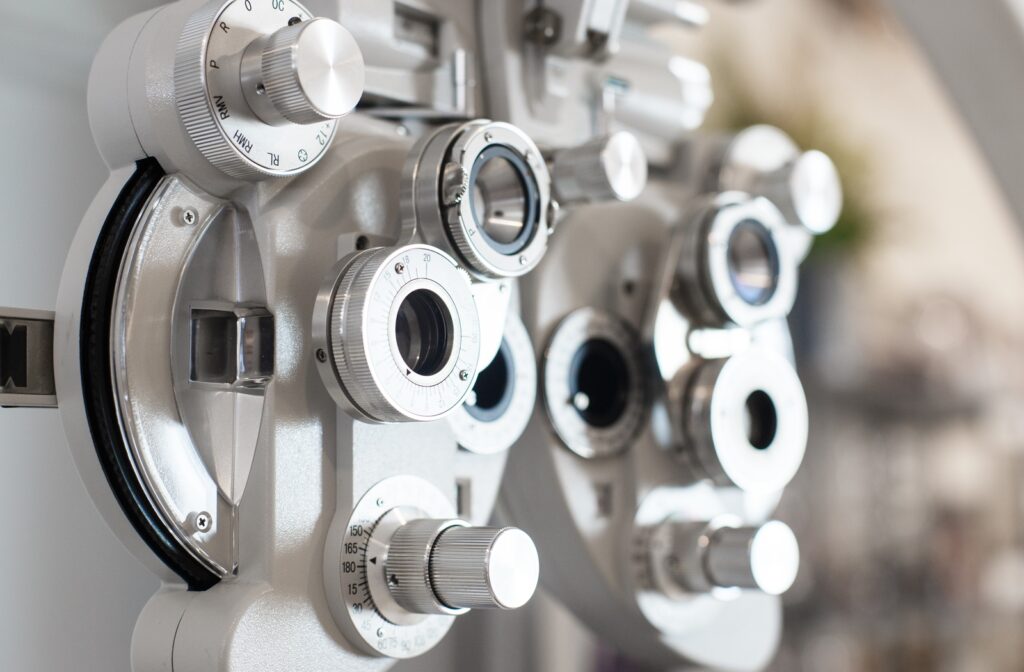Consistency is key when it comes to your visual health. Vision care starts with visiting your optometrist for regular eye exams that can help with early detection and management of potential eye diseases and other vision issues.
But what should you do if you haven’t had an eye exam in years and are looking to schedule one? Let’s explore what you can expect from an eye exam and how it can benefit you.
Preserving Your Long-Term Vision
If it’s been years since you visited your optometrist, you may want to schedule your next appointment today. Regular eye exams are essential to help ensure your eyes are healthy and your vision is optimal.
During your comprehensive eye examination, your optometrist will:
- Review your health and vision history
- Test how well you can see details at a distance, usually with a eye chart (visual acuity test)
- Test your ability to see clearly (refractive error test)
- Measure your eye pressure
- Do retinal imaging in order to have a look at the retina, optic disc, and blood vessels to check for any potential issues
- Perform a comprehensive eye health exam
An eye exam also allows your optometrist to check for any signs of developing eye diseases. Many eye diseases can develop without symptoms, so a regular exam schedule can make all the difference with early detection, which leads to earlier treatment and management.
As you age, your eyes become more susceptible to eye diseases such as glaucoma, cataracts, and macular degeneration.
So what can you do if you haven’t had an eye exam in years? Commit to finding the right optometrist and get a comprehensive check-up.
Your vision is ever-changing and developing from a young age through adulthood. A consistent eye exam schedule can help monitor for any irregularities in your vision.
Eye Exam Frequency
Your eye exam schedule can vary and depends on if you’re at a higher risk of developing eye diseases or experiencing vision issues. The recommended eye exam frequency for adults and seniors is:
- 18–39 years old: one exam every 1-2 years
- 40–64 years old: one exam every 1-2 years
- 65 and older: one exam every year
Your optometrist may prepare a different exam schedule for you based on your unique vision needs.
What to Expect During Your Exam
If you haven’t had an eye exam in years, there’s a good chance you may need a dilated eye exam to make it easier for your optometrist to inspect all the details of your eyes. You’ll be notified prior to your appointment if you should arrange for transportation to and from the exam for safety purposes.
Your vision may be blurry, and your eyes may be sensitive to light for a few hours following your dilated eye exam, and safety comes first!
Even if you’re not noticing dramatic changes in your vision, an eye exam is a powerful tool to help assess your vision and allow your optometrist to note any changes in your prescription.
Your eyes are a window to your overall health. Regular eye exams can be a form of early detection and treatment for other serious health conditions. Problems in your eyes can sometimes signify signs of disease in other parts of your body.
Some different conditions an eye exam can help detect:
- Brain injuries and neurological conditions
- High blood pressure
- Diabetes
- Cancer
Your eye exam will begin with a conversation with your optometrist, where you’ll discuss your general health history, visual needs, and symptoms you may be concerned about before the exam.
Following the exam, your optometrist can answer any questions you may have and provide you with an updated prescription for new glasses or contact lenses if needed.
Get Back to Consistency
If you haven’t gone in for an eye exam in years, now is an excellent time to book one! Eye health is a vital part of everyday life. Consistent eye exams can help deliver peace of mind and check for potentially severe vision issues.
Book an appointment with our Ottawa optometrists at EyeDocs Ottawa today and get back to consistent vision care habits.




